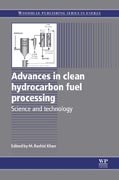
Conventional coal, oil and gas resources used worldwide for power production and transportation are limited and unsustainable. Research and development into clean, alternative hydrocarbon fuels is therefore aimed at improving fuel security through exploring new feedstock conversion techniques, improving production efficiency and reducing environmental impacts. Following introductory overviews of the feedstocks, environmental issues and life cycle assessment for alternative hydrocarbon fuel processing, sections go on to review solid, liquidand gaseous fuel conversion. Solid fuel coverage includes reviews of liquefaction, gasification, pyrolysis and biomass catalysis. Liquid fuel coverage includes reviews of sulfur removal, partial oxidation and hydroconversion. Gaseousfuel coverage includes reviews of Fischer-Tropsch synthesis, methanol and dimethyl ether production, water-gas shift technology and natural gas hydrate conversion. The final section examines environmental degradation issues in fuel processing plants as well as automation, advanced process control and process modelling techniques for plant optimization. Written by an international team of expert contributors, Advances in clean hydrocarbon fuel processing provides a valuable reference for fuel processing engineers, industrial petrochemists and energy professionals, as well as for researchers and academics in this field. INDICE: Part 1 overview and assessment of hydrocarbon fuel conversion processes: Characterisation and preparation of biomass, oil shale and coal-based feedstocks; Production properties and environmental impact of hydrocarbon fuel conversion; Life cycle assessment (LCA) of alternative hydrocarbon fuel conversion. Part 2 Solid hydrocarbon fuel processing and technology: Direct liquefaction (DCL) processes and technology for coal and biomass conversion; Gasification processes and technology for the conversion of hydrocarbon residuals; Pyrolysis processes and technology for the conversion of hydrocarbons and biomass;Biomass catalysis in conventional refineries. Part 3 Liquid hydrocarbon fuel processing and technology: Sulfur removal from heavy and light petroleum hydrocarbon by selective oxidation; Partial oxidation (POX) processes and technology for clean fuel and chemical production; Hydroconversion processes and technology for clean fuel and chemical production. Part 4 gaseous hydrocarbon fuel processing and technology: Middle distillate fuel production from synthesis gasvia the Fischer-Tropsch process; Methanol and dimethyl ether (DME) productionfrom synthesis gas; Advances in water-gas shift technology: modern catalysts and improved reactor concepts; Natural gas hydrate conversion processes. Part 5 Operational issues and process improvement in hydrocarbon fuel processing plant: Environmental degradation in hydrocarbon fuel processing plant: issues and mitigation; Automation technology in hydrocarbon fuel processing plant; Advanced process control for clean fuel production: Smart plant of the future; Process modelling for hydrocarbon fuel conversion; Appendix: Syngas and hydrogen production processes and technology.
- ISBN: 978-1-84569-727-3
- Editorial: Woodhead
- Encuadernacion: Cartoné
- Páginas: 544
- Fecha Publicación: 01/09/2011
- Nº Volúmenes: 1
- Idioma: Inglés
